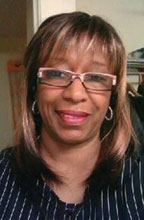

Breast Cancer: A major health concern for Black women
October is National Breast Cancer Awareness Month
Breast cancer survivor Linda Williams. (Courtesy Photo)
By Zachary Lester and Maria Adebola From the Afro-American Newspaper
When Linda Williams first learned that she had breast cancer, she felt doomed.
“Cancer seems always associated with death,” Williams said. “I was feeling defeated, like I had to succumb.”
October is National Breast Cancer Awareness Month. National public service organizations, professional medical associations, and government agencies work together to promote the need for women to conduct monthly breast self-exams, have annual mammograms and take control of their breast health.
According to the American Cancer Society, in 2013 about 232,340 new cases of invasive breast cancer will be diagnosed in women and about 39,620 women will die from breast cancer. There are more than 2.8 million breast cancer survivors in the United States.
Breast cancer is of particular concern to African-American women, officials said. Though white women are slightly more likely to develop breast cancer than African-American women, in women under 45, breast cancer is more common in African Americans. African-American women also are more likely to die of breast cancer than other groups, statistics show.
“Their tumors often are found at a later, more advanced stage,” according to womenshealth.org. “So, there are fewer treatment options. Some other reasons for this may include not being able to get health care or not following-up after getting abnormal test results. Other reasons may include distrust of the health care system, the belief that mammograms are not needed, or not having insurance. Also, research has shown that African-American women are more likely to get a form of breast cancer that spreads more quickly.”
Men, too, can contract breast cancer. According to the American Cancer Society, symptoms in men may include a lump or swelling on the breast, skin dimpling or puckering, a nipple turned inward, redness or scaling of the nipple or breast skin or nipple discharge.
“Sometimes a breast cancer can spread to lymph nodes under the arm or around the collar bone and cause a lump or swelling there, even before the original tumor in the breast tissue is large enough to be felt” in men, according to the ACS website.
Men who notice an abnormality should also seek immediate medical attention, as well.
More prevalent among African-American women who suffer from the disease is Triple Negative Breast Cancer, which is more difficult to treat, officials said
According to breast cancer statistics, about 85 percent of breast cancers occur in women who have no family history of the disease, due to genetic mutations that happen as a result of aging, research shows.
Several Baltimore-area women described their encounters with the dreaded disease.
Northeast Baltimore resident Rhonda Adams, 67, was diagnosed with having cancer in her left breast in 1993.
“My life flashed before my eyes,” she said. “I lost all sense if reality.”
She opted to have the breast removed, then began treatment. She said a “strong support system and prayer got me through it.”
Roslyn Rogers, 61, of Baltimore, was diagnosed in May. She had a double mastectomy in August.
“It was like I heard echoes when he said it was cancer,” she said. “I didn’t hear anything he said after that. It took me about three or four days to face reality.”
She is confident that “God will see me through this” and said “my faith keeps my hope up.”
She advises women to get a mammogram as often as possible.
Williams had no family history of cancer when she was diagnosed with inflammatory breast cancer in 2007. According to the National Cancer Institute, inflammatory breast cancer (IBC) is a rare and very aggressive disease also more common and diagnosed at younger ages in African American women than in White women. This type of breast cancer is called “inflammatory” because symptoms of the cancer include swelling, and redness that affects a third or more of the breast.
Williams said she had noticed some redness on her breast, but she never paid attention to it. Then, one morning when she was casually stretching, she noticed something when her hand ran across her right breast.
“When I found the lump on my right breast, I went to my doctor and within a week it was confirmed that I had cancer,” she said. “I was diagnosed with stage three, which means it had spread to my lymph nodes.”
Doctors ordered an aggressive treatment regimen, including several weeks of chemotherapy, which she said, “took a toll” on her body.
“I was always tired,” she said.
After going through chemotherapy, Williams underwent a mastectomy, then an additional year of chemotherapy and radiation.
She has now been cancer free for six years.
Williams now has regular health exams and takes extra steps, including eating healthy. She urged other women to be aggressive about their health.
“We have…resources and information now to prevent breast cancer,” she said.
Though doctors don’t know how to prevent breast cancer, eating healthy foods, getting plenty of exercising, refraining from smoking and recreational drug use and limiting alcohol are believed to help.
The best tool, though, is early breast cancer screening.
“Breast cancer screening looks for signs of cancer before a woman has symptoms,” according to womenshealth.org. “Screening can help find breast cancer early when it’s most treatable.”
Two tests are commonly used to screen for breast cancer, including mammograms, low-dose xrays of breast tissues that can detect abnormalities and clinical breast exams, where a physician examines the breasts. Women are also asked to do monthly self-exams.
Organizations like Sisters Network help in raising awareness locally and nationally about the devastating impact that breast cancer has had in the African American community.
For more information, see Taking Charge of Breast Cancer: A Guide For African American Women, a video that explains the risk factors, screening tests and some common treatments for it” at www.cancer.org/healthy/toolsandcalculators/videos/taking-charge-of-breast-cancer


Be the first to comment